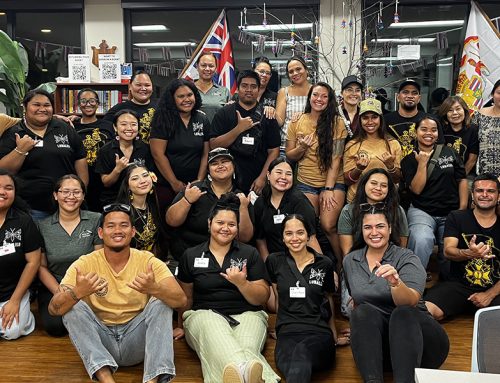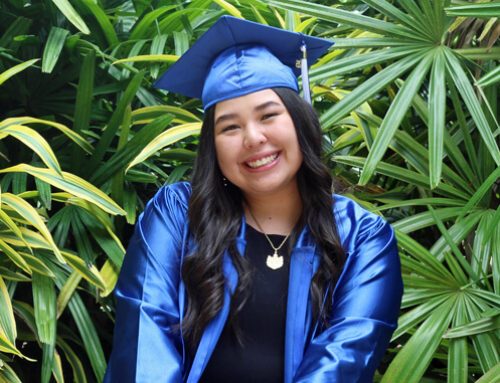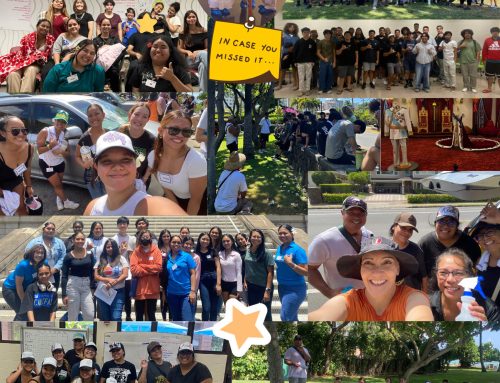Can a single year make a lasting difference in a person’s life? You bet it can.
It did for Jennifer Wong-Ala and Shyanne Humel. In their case, one year meant the difference between a life of mere survival and one full of possibilities.
Shyanne and Jennifer are graduates of Lunalilo Scholars Project. Quite simply, it plucks disadvantaged and at-risk individuals out of seemingly hopeless situations and gives them a year of college-level education, intensive background services and support — and unlimited hope.
Both were foster kids who grew up fighting for any scrap of happiness and security they could find. Neither believed college was in their future. In fact, Shyanne, who had to leave her foster home at 17, thought she had no future at all.

“I saw nothing for myself after high school,” she says. “I had no idea how to even try to see a future for myself.”
But a caring teacher thought otherwise. The teacher took her into her own home during Shyanne’s senior year — and it was that teacher who encouraged her to apply for Lunalilo Scholars Project.

“I wasn’t the most confident person. Didn’t have that much faith that I could be something,” Shyanne admits. “I just applied to make my teacher happy.”
Jennifer’s life was just as tough. She was forced into a sobering realization while still a kid in grade school.

“I felt kind of alone,” she says. “During that time I was going through a lot. I was sad a lot of the time. I realized that if I wanted to make a difference in my life, I had to do it. And I had to find other people in my life who were willing to help me.”
Enter LaVache (La-vashay) Scanlan, an associate professor at Kapiolani Community College and director of Lunalilo Scholars Project. She contacted both girls and, in doing so, changed the trajectory of their lives.

“She kind of took hold,” Jennifer says of Scanlan, “and never really let go. She’d always listen. I would go into her office and talk to her about almost anything.”
Lunalilo Scholars Project gives one-year scholarships to KCC, and that alone is pretty generous. Just as important is the background support it wraps around each student.

Scanlan describes her role this way: “Anything they might need — a lot of counseling, a lot of talking, a lot of supporting. We find a way to find a solution.”
That means helping them find suitable living situations and teaching them how to live on their own, how to study and how to find ways to continue their education after their scholarships end — all the things kids in normal households learn from their families.
Lester Kaneta and wife Marian started Lunalilo Scholars Project three years ago in partnership with KCC and University of Hawaii Foundation. He says it’s working exactly as it should.

“We wanted to create a more lasting change,” he says. “We wanted to break that cycle of poverty.”
The keys, Kaneta says, are education and support.

“We provide tools, but more than that we give our students a sense of family, a sense of community,” he says.
Kaneta says they’ll take anybody, at any age, as long as they sincerely want to better their lives:

“We’re looking for people who want to pull themselves up by their bootstraps and who want to prove themselves.”
In its three years, the project has succeeded and is growing. Kaneta Foundation funded 20 students the first year. The next year, 50.
Lunalilo Project students have outperformed their counterparts in the general population in retention, grades and total credits earned. So he’d like to double the amount of recipients. So far, the foundation has funded every student, but in order to grow the program, he needs help.

“We’re looking for like-minded people who are willing to invest $6,000 per student,” says Kaneta. “We’re looking for people who want to transform lives.”
The payback is immense. Success breeds success. “The scholars return to mentor new students,” he says.
Jennifer, who survived her first year and is now a sophomore at KCC, wants to be an oceanographer. Shyanne, now a junior at Manoa, is determined to be an English professor. Both feel inspired to give back as much or more than they’ve received.
Jennifer wants to help other kids find their way to the “family.”

“We had a place where we could go,” she says, “to hang out with people who were happy. I think when you’re around happy people, you tend to be happy, too.”
Shyanne adds, “I feel very grateful for it. Now that it’s helped me, I can help other people who will go through the program.
“So there’s this big recycling of hope and love and faith.”
What a perfect way to describe it: A recycling of hope and love and faith.





